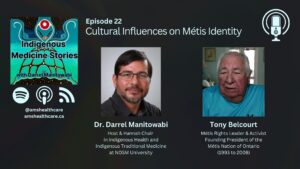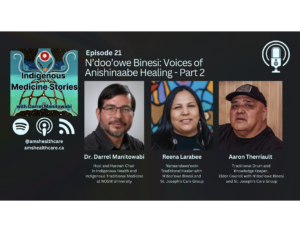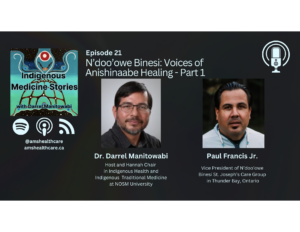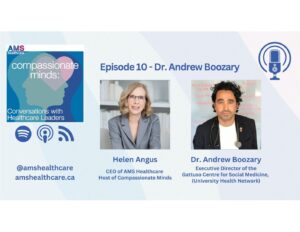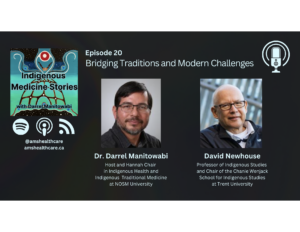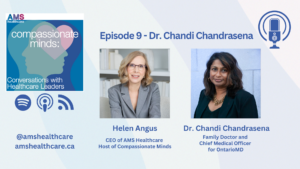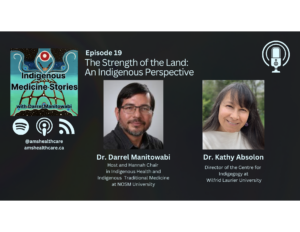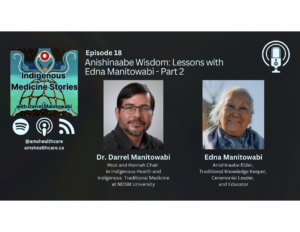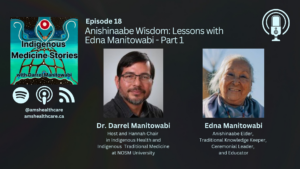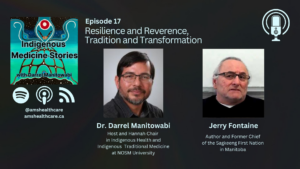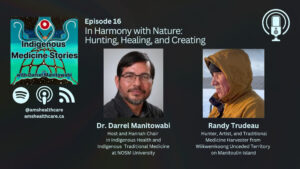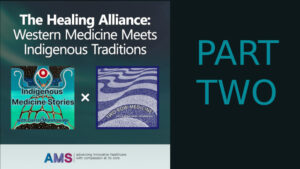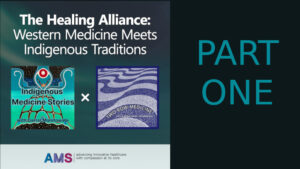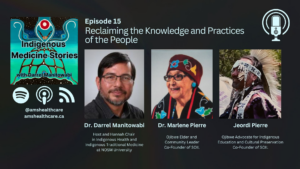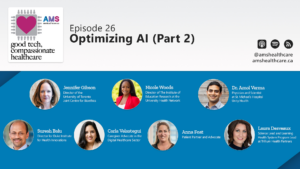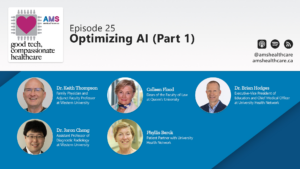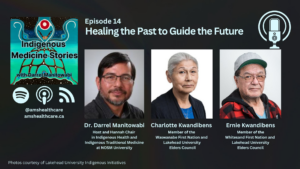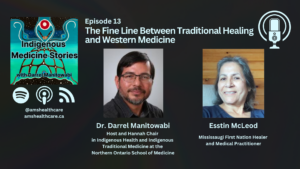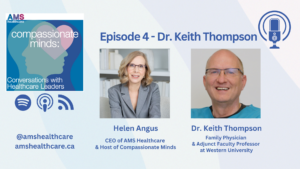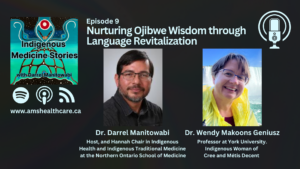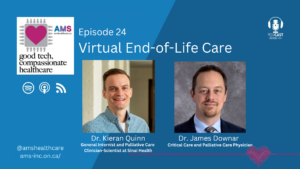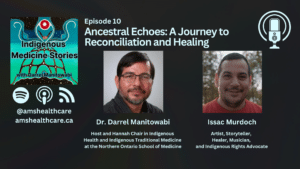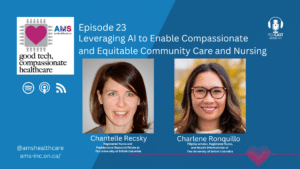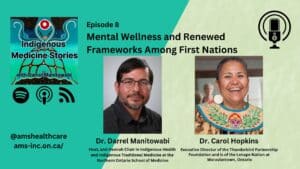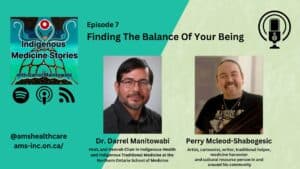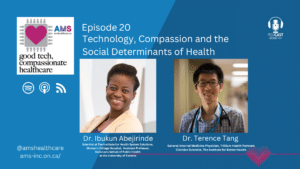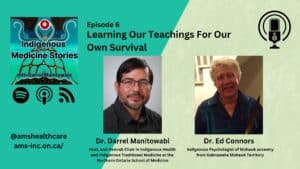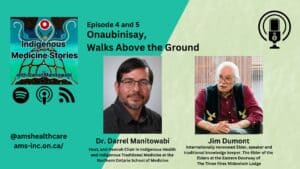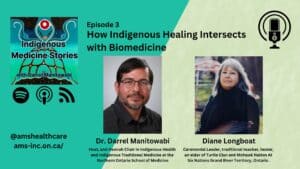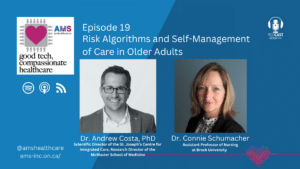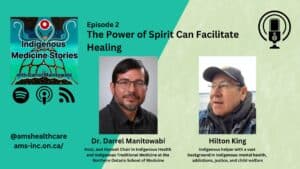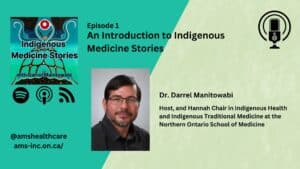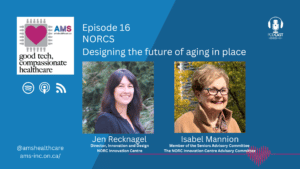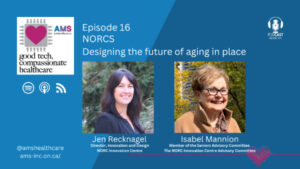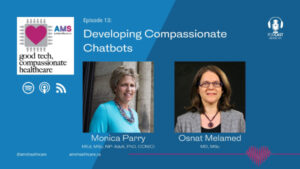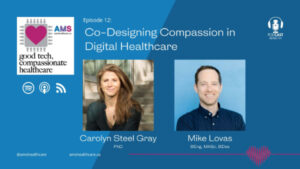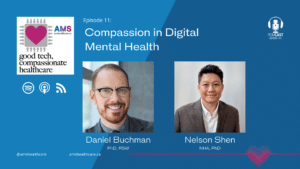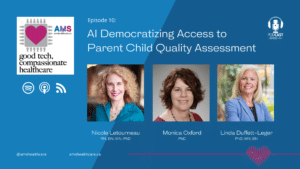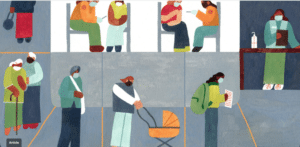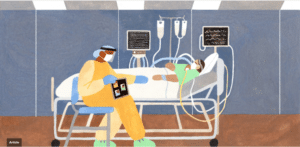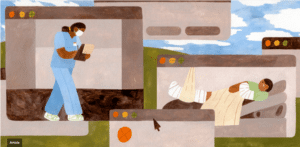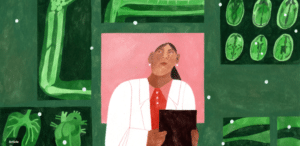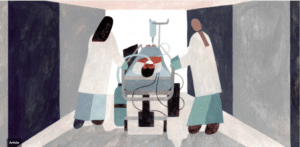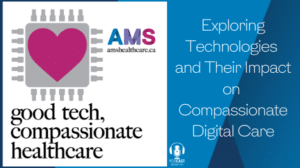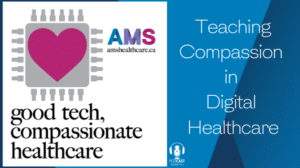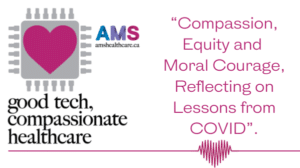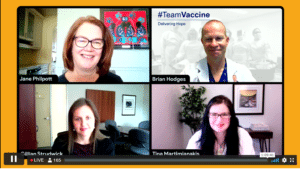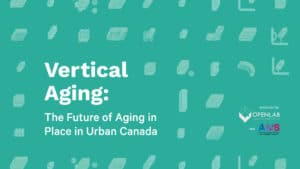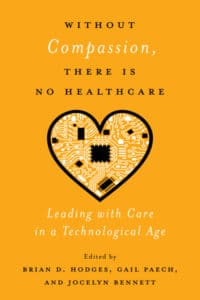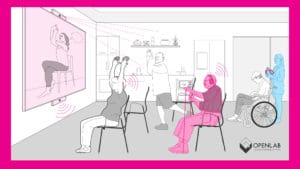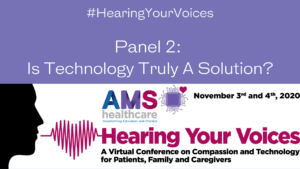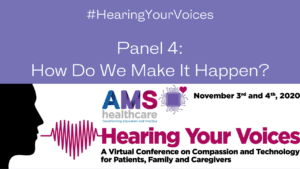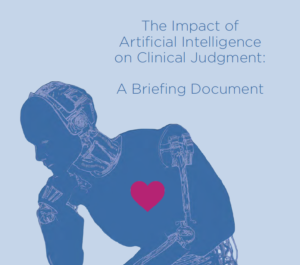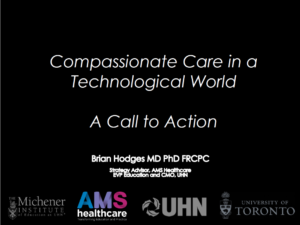All Resources
Compassionate Minds – Dr. Andrew Bond – Episode 11
In this episode, host Helen Angus, CEO of AMS Healthcare, speaks with Dr. Andrew Bond. He is the Senior Vice President and Medical Director at GreenShield, Canada’s only national non profit health and benefits provider, where he leads the Enterprise Clinical Office providing clinical governance for quality, innovation and health policy and partnerships for GreenShield’s…
Compassionate Minds – Dr. Andrew Boozary – Episode 10
In this episode, host Helen Angus, CEO of AMS Healthcare, speaks with Dr. Andrew Boozary, a primary care physician, policy practitioner, researcher, and founding executive director of the Gattuso Centre for Social Medicine at the University Health Network. He completed his medical training at the University of Toronto and health policy training at Princeton University…
Compassionate Minds – Dr. Chandi Chandrasena – Episode 9
In this episode, host Helen Angus, CEO of AMS Healthcare, speaks with Dr. Chandi Chandrasena, OntarioMD’s Chief Medical Officer, providing the clinical perspective to inform digital health products and services for physicians. She plays a key role with digital health technology, clinician engagement, change management and education, and is actively involved in provincial and national…
Compassionate Minds – Anna Greenberg – Episode 8
In this episode, host Helen Angus, CEO of AMS Healthcare, speaks with Anna Greenberg. Anna is a highly regarded member of Ontario Health’s senior leadership team, serving in a number of roles since the organization’s beginning. She served as the inaugural Chief of Strategy and Planning and as Chief Regional Officer, Toronto and East, for…
Compassionate Minds – Donna Duncan – Episode 7
In this episode, host Helen Angus, CEO of AMS Healthcare, speaks with Donna Duncan. Donna Duncan is a passionate seniors’ care, mental health advocate, and broader public sector leader, bringing more than 20 years of experience in advancing transformative change at organization and system levels. As CEO of the Ontario Long Term Care Association, Donna…
Compassionate Minds – Sophia Ikura – Episode 6
In this episode, host Helen Angus, CEO of AMS Healthcare, speaks with Sophia Ikura. Sophia is the founder and Executive Director of Health Commons, a pioneering organization dedicated to addressing health disparities by combining the tools of a diverse set of disciplines from epidemiology to service design and political science to bring community-driven solutions into…
Optimizing AI – Part Two
Thank you for joining us for this special episode of Good Tech Compassionate Healthcare. In May of 2024, AMS Healthcare was thrilled to convene 170 healthcare stakeholders from across Ontario to delve into the timely and ethical scaling of AI in our healthcare sector. The insights we gained were invaluable. The conference revealed a consensus…
Optimizing AI – Part One
Thank you for joining us for this special episode of Good Tech Compassionate Healthcare. In May of 2024, AMS Healthcare was thrilled to convene 170 healthcare stakeholders from across Ontario to delve into the timely and ethical scaling of AI in our healthcare sector. The insights we gained were invaluable. The conference revealed a consensus…
Compassionate Minds – Dr. Brian Hodges – Episode 5
In this episode, host Helen Angus, CEO of AMS Healthcare, speaks with Dr. Brian Hodges. Brian Hodges is Executive-Vice President Education and Chief Medical Officer at University Health Network, and Professor in the Temerty Faculty of Medicine at the University of Toronto and President of the Royal College of Physicians and Surgeons of Canada. Brian…
Compassionate Minds: Dr. Keith Thompson Episode 4
In this episode, host Helen Angus, CEO of AMS Healthcare, speaks with Dr. Keith Thompson. Dr. Thompson is a family physician, a graduate of the Schulich School of Medicine and Dentistry, and an Adjunct Faculty Professor with both the departments of Family Medicine and the Institute for Earth and Space Exploration at Western University. He…
Compassionate Minds: Dr. Lisa Richardson Episode 3
In this episode, host Helen Angus, CEO of AMS Healthcare, speaks with Dr. Lisa Richardson. Dr. Lisa Richardson practices General Internal Medicine at the Toronto General Hospital and is the Associate Dean, Inclusion and Diversity; as well as Acting Vice Dean, Strategy, at the University of Toronto’s Temerty Faculty of Medicine. She is an education…
Virtual End of Life Care
In this conversation, Kieran Quinn, a general internist and palliative care clinician-scientist at Sinai Health in the Department of Medicine and at the Institute of Health Policy, Management, and Evaluation at the University of Toronto, and James Downer, a critical care and palliative care physician in Ottawa, discuss virtual end-of-life care during the COVID-19 pandemic.…
Compassionate Minds: Nicole Woods – Episode 2
In this episode, host Helen Angus, CEO of AMS Healthcare, speaks with Nicole Woods. Nicole (Nikki) Woods, PhD is the Richard and Elizabeth Currie Chair for Research in Health Professions Education. She is also Director of The Institute for Education Research (TIER) at University Health Network and Senior Scientist at The Wilson Centre, University of Toronto. Dr. Woods leads an…
Compassionate Minds: Adil Khalfan – Episode 1
In this episode, host Helen Angus, CEO of AMS Healthcare, speaks with Adil Khalfan. Adil Khalfan is President and CEO of Kensington Health, a not-for-profit health service organization located in Toronto, Ontario. Adil has a vast background in nursing, public health, international development, and health system strategy in Canada and internationally. His career has crossed…
Leveraging AI to Enable Compassionate and Equitable Community Care and Nursing
In this conversation, Charlene Ronquillo, a Filipina scholar, registered nurse, and health implementation expert at the University of British Columbia School of Nursing, engages in a captivating dialogue with Chantelle Recsky, a dedicated nurse and postdoctoral research fellow. Together, they delve into the crucial topic of “Advancing Compassionate and Equitable Healthcare through Technology.” Charlene, an…
The Compassion Code, Promoting Fairness in AI for Mental Health
In this conversation, Laura Sikstrom, a Medical Anthropologist and Project Scientist at The Krembil Center for Neuroinformatics at the Center for Addiction and Mental Health, and an AMS Healthcare fellow in Compassion and AI, speaks with Sean Hill, the Director of The Krembil Center for Neuroinformatics, Senior Scientist at the Center for Addiction and Mental…
Generative AI in Healthcare
In this episode, AMS Board Members Kumanan Wilson, Interim CEO and Chief Scientific Officer, Bruyère Research Institute, chats with Jaron Chong, Assistant Professor of Diagnostic Radiology at the Department of Medical Imaging at Western University and Chair of the Canadian Association of Radiology Standing Committee on Artificial Intelligence. They discuss the opportunities for generative AI in healthcare diagnosis, efficiencies, and education,…
Technology, Compassion and the Social Determinants of Health
In this conversation, Ibukun Abejirinde, a scientist at the Institute for Health System Solutions at Women’s College Hospital, and Assistant Professor at the Dalla Lana School of Public Health at the University of Toronto, and an AMS Healthcare Fellow in Compassion and AI chats with Terence Tang, a General Internal Medicine Physician at Trillium Health…
Risk Algorithms and Self-Management of Care in Older Adults
In this episode, Dr. Connie Schumacher, Assistant Professor of Nursing at Brock University and an AMS fellow in compassionate AI, and Dr. Andrew Costa, Associate Professor at McMaster University and the Research Director at the St. Joseph’s Health System Center for Integrative Care in Hamilton and Connie’s mentor, discuss Connie’s research on compassion centered communication of risk…
Digital Monitoring of Stress Responses Among Nursing Professionals
Biographies Gillian Strudwick Venkat Bhat If you wish to participate in the study Program: Interventional Neuropsychiatry Program Study Funder Department of Defense, Canada (IDeAS Program) UHT-St. Michael’s link to the Phase 1 of the current project (Phase 2) Useful Resources: https://covid19-sciencetable.ca/sciencebrief/burnout-in-hospital-based-healthcare-workers-during-covid-19/ https://pubmed.ncbi.nlm.nih.gov/35614505/ https://theconversation.com/high-rates-of-covid-19-burnout-could-lead-to-shortage-of-health-care-workers-166476 https://www.researchprotocols.org/2022/2/e32240/ Pertinent Publication Links: https://pubmed.ncbi.nlm.nih.gov/34871178/ https://www.ncbi.nlm.nih.gov/pmc/articles/PMC9731177/ https://ieeexplore.ieee.org/stamp/stamp.jsp?arnumber=10095849 https://pubmed.ncbi.nlm.nih.gov/36310921/ Listen to the Podcast HERE
Digital Therapeutics Informed by Lived Experience
In this conversation, Quynh Pham, Scientific Director & Principal Investigator at the Centre for Digital Therapeutics at the University Health Network and an AMS Healthcare Fellow in Compassion and AI speaks with Joseph A Cafazzo, (Cafahzzo)biomedical engineer, educator and researcher and the Wolfond Chair in Digital Health, University Health Network Quynh and Joe engage on…
Designing the Future of Aging in Place
Jen Recknagel Director, Innovation and Design, NORC Innovation Centre Jen combines a background in human-centered design to address challenges at the intersection of health and its social determinants. Experienced with executing a variety of service design projects, she is currently the Senior Design Lead at UHN OpenLab, and Director of Innovation and Design at the…
Designing the Future of Ageing in Place
Jen Recknagel Director, Innovation and Design, NORC Innovation Centre Jen combines a background in human-centered design to address challenges at the intersection of health and its social determinants. Experienced with executing a variety of service design projects, she is currently the Senior Design Lead at UHN OpenLab, and Director of Innovation and Design at the…
Digital Health Equity
In this conversation, Benjamin Chin-Yee, an AMS Healthcare Fellow in Compassion and AI Clinical Fellow in Hematology at Western University and Post Doctoral Associate at the Rotman Institute of Philosophy at Western engages with Jay Shaw, an AMS Healthcare Phoenix Fellow Assistant Professor in the Department of Physical Therapy at the University of Toronto and Research Director…
Digital Peer Support
In this episode, Sarah Munce, Scientist at the KITE Research Institute at the University Health Network, and Assistant Professor in the department of Occupational Science and Occupational Therapy at the University of Toronto, and Jennifer Stinson, Nurse and Clinician Scientist in the Child Health Evaluative Science Programs within the Research Institute at the Hospital for…
Developing Compassionate Chatbots
A Conversational Health Chatbot, Bringing Compassion to a Tailored Digital Health Intervention for Women with Heart Disease. Supervisors and Mentors Dr. Elizabeth Peter, Professor, Lawrence S. Bloomberg Faculty of Nursing, University of Toronto. Dr. Peter locates her work in feminist health care and will provide mentorship in compassionate care. Dr. Joe Cafazzo, Executive Director, Healthcare…
Co Designing Compassion in Digital Healthcare
In this episode we have two brilliant scientists, both AMS Fellows in AI and Compassion, discussing how important compassion is in the co-design of digital care allowing for buy- in, ownership and engagement for patient, provider and community alike. Carolyn Steele-Gray, PhD Scientist, Toronto’s Bridgepoint Laboratory for Research and Innovation, Sinai Health Assistant Professor, Institute…
National licensure, better virtual-care needed to fix system ‘close to the precipice’: CMA president
This article was written in partnership with Healthy Debate, and is part of a series of seven articles that explore the relationship between technology and compassion in the field of health care today, and especially during the COVID-19 pandemic. Author: Inori Roy Illustrator: Winsome Adelia Tse Of all the responsibilities anesthesiologists undertake in their day-to-day duties,…
The past, present and future of race and colonialism in medicine
Ellen J. Amster, AMS Healthcare Hannah Chair.May 24, 2022 This article was first published in the CMAJ on May 24, 2022. The original article can be accessed here. Western medicine has begun a reckoning with its inconvenient pasts, from dethroning medical heroes to an increasing awareness of how doctors have treated colonized and enslaved populations.…
Compassion in Digital Mental Health
Good Tech, Compassionate Care Podcast: Today’s conversation focuses on how digital interventions during COVID impacted the way we deliver compassionate care.
AI Democratizing Access to Parent Child Quality Assessment
Good Tech, Compassionate Care Podcast: Today’s conversation focuses on how digital interventions during COVID impacted the way we deliver compassionate care.
Mandatory COVID-19 vaccination in schools this fall? Ontario’s 1982 legislation spurred organized opposition
This blog was written by AMS Healthcare History of Medicine and Healthcare Program 2020 project grant recipient Catherine Carstairs and her colleagues from the University of Guelph. It very nicely supports the AMS Healthcare concept that History of Medicine research can and does act as a source of lessons that shape or inform the Canadian…
A Supportive Action Plan for Patients, Caregivers and Organization
AMS Healthcare has put together this guide that outlines key messages and requests targeted to the various decision-makers and stakeholder groups with whom you may meet.
Patient and Caregiver Report on Technology and Compassion During COVID-19
Using the data gathered from our 2020 Virtual Conference: Hearing Your Voices, AMS Healthcare has compiled a set of recommendations for ensuring healthcare remains compassionate in the face of technological advancements.
Building Virtual Relationships
Drs. Alika Lafontaine and Brian D. Hodges discuss Building Virtual Relationships.
Communities are taking the lead on vaccinating hot spots
The provincial system for booking vaccine appointments, which has been confusing and dysfunctional for many, can require resources and skills that those who are most vulnerable to contracting COVID-19 don’t always have.
Saying Goodbye on FaceTime
Participating in that call was “gut-wrenching,” Shaikh said, but she realized that to maintain the emotional stamina she would need to make it through the pandemic, she would “have to change (her) perspective.”
Virtual simulation in nursing education: Balancing care for the ‘failing heart’ and the ‘breaking heart’
Proponents of the simulations say they give students a solid foundation of technical and theoretical knowledge, but more importantly, they develop higher-level cognitive skills.
Seniors with dementia in LTC homes are using virtual reality to relive their pasts
Caregivers and researchers hope that LTC residents who visit lifelike simulations of meaningful places from their pasts will recall old memories not yet motheaten by dementia, causing them to feel a sense of wistful joy, a swell of pride and to open up to others.
Could AI make health care more human?
CHARTwatch, is a tool that uses artificial intelligence (AI) to continuously monitor the medical status of patients on Saint Michael’s General Internal Medicine unit.
‘You need not be alone anymore’: The doctor redefining palliative care
Palliative care physicians were no longer on-call consultants or experts brought in only when it became clear that a patient was forgoing curative or life-prolonging medical treatment. They became a fixture of the emergency department.
How one ER partnered with a mental-health organization to care for youth in distress
First-hand knowledge of what it’s like to struggle with mental illness and substance use – and what it takes to recover – complements the clinical expertise of the ER team.
Exploring Technologies and Their Impact on Compassionate Digital Care
Good Tech, Compassionate Care Podcast: This conversation focuses on exploring technologies and their impact on compassionate healthcare
Teaching Compassion in Digital Healthcare
Good Tech, Compassionate Care Podcast: In this conversation, Educators and Learners reflect on the challenges of teaching, and learning, compassion in this digital age.
Digital Interventions During COVID on Mental Health
Good Tech, Compassionate Care Podcast: Today’s conversation focuses on how digital interventions during COVID impacted the way we deliver compassionate care.
Compassion, Equity and Moral Courage, Reflecting on Lessons From COVID
Good Tech, Compassionate Care Podcast: A discussion on Compassion, Equity and Moral Courage and a reflection on lessons learned from COVID.
Leading with Care in a Technological Age
Dr. Jane Phillpot moderates a panel of authors including, Brian Hodges, Gillian Strudwick and Tina Martimianakis.
Vertical Aging The Future of Aging in Place in Urban Canada
On February 3rd, 2021 OpenLab and AMS hosted a webinar to launch Vertical Aging: The Future of Aging in Place in Urban Canada and the release of the three reports.
Without Compassion, There is No Healthcare
28 outstanding Canadian healthcare leaders confront the challenges threatening our current and future healthcare system. Across a variety of domains, the authors ask, What is compassion?
Vertical Aging: Social Spaces
The design of our physical spaces matters more to psycho-social states of well-being than ever previously imagined. This report aims to understand the stock of rental apartment buildings (in Toronto) that qualify as NORCs.
Vertical Aging: The Connected Care Hub
Connected Care Hub is a mixed model of service delivery that utilizes both physical and digital supports to help seniors in NORC buildings age in place.
Vertical Aging: The Digital Neighbour Network
In order to remain at home, most seniors will need some type of support to get by. Neighbour-to-Neighbour networks may help fill that gap, especially if located within the same building or neighbourhood.
Hearing Your Voices Conference Panel 1: The power of lived experience
Hear from patient partners who share their lived experiences and offer their suggestions on what makes a compassionate digitally enabled healthcare system.
Hearing Your Voices Conference Panel 2: Is technology truly a solution?
Technology is often seen as critical to how health and healthcare evolve. This discussion explored areas where technology may be a good solution, but not the only solution. It also mentions where low-tech options might better serve patients, caregivers, and their healthcare partners.
Hearing Your Voices Conference Panel 3: Digital Health: How do we get there together?
Concerns have been raised about equity in accessing digital healthcare and ensuring patients, physicians, and providers are supported to partner in care together. This panel explored the challenges and barriers and offered insight and expertise for drivers and solutions.
Hearing Your Voices Conference Panel 4: How do we make it happen?
This panel discussed the support patients and caregivers need to fully engage with digital health technologies; the support providers need and how we prepare them for digital health technologies, and the leadership required to help us realize this future.
Nursing and compassionate care in the age of artificial intelligence
This report outlines 15 recommendations to prepare nurses and nursing students to use artificially intelligent health technologies (AIHTs) to augment the patient experience, while ensuring the delivery of quality, person-centred, and compassionate nursing care.
Empowering patients and caregivers in the era of digital health
This AMS-sponsored report is for patients and caregivers. It takes a look at health technologies (mobile apps, AI, electronic health records, etc.) to understand their benefits and risks (privacy concerns, equity and accessibility, etc.). It also explores the cultural changes needed before such technologies can be widely—and appropriately—implemented. Read it and you’ll be ready to help shape the way we incorporate digital health technologies into Canadian healthcare.
Nursing and compassionate care in a technological world
This AMS-sponsored report digs into the implications of artificial intelligence, machine learning, automation, and robotics for the future of nursing and for nurses’ ability to provide compassionate, person-centered nursing care. If you’re an RN, RPN, or NP, this report is for you.
The impact of artificial intelligence on clinical judgment
In this AMS-sponsored report, physicians and medical educators can learn about the current and potential links between AI and clinical judgment. It provides a clear explanation of how AI will likely support, but not to replace, the judgment of physicians.
Machines, ethics and equity
Dr. Jay Shaw discusses how digital technology is used in healthcare today and how its use is impacting equity and ethics in medicine.
Compassionate care in a technological world
Want to see examples of how technology is changing various professional roles in healthcare, or learn which issues we need to keep in mind in this context? View the presentation slides from this 2019 talk.
Designing healthcare services for excellence and empathy
Check out the slides from Professor Elizabeth Teisberg’s 2019 AMS talk that explored how healthcare can achieve better value for money.
14 resources on artificial intelligence, ethics, and governance
Gathered by AMS fellow Dr. Jay Shaw, these 14 articles offer a rich overview of the issues arising from the increasing use of artificial intelligence (AI) in healthcare, including the management of big data.
Compassion in a technological world: Advancing AMS’s strategic aims
This 2019 roadmap contains key questions, the answers to which will shape AMS’s role as a catalyst for innovation. It provides an overview of the most transformative technologies on the horizon and explores the potential impacts and issues ahead.
AI, machine learning and the potential impacts on the practice of family medicine
Will modern medical technology give physicians more time to focus on the human and healing portion of their jobs, or will it initiate workplace surveillance, productivity measurement, and eventually supplant human physicians? This report sets the stage for leaders in family medicine to prepare themselves, the profession, and their patients for conversations about the changes to come, given the possibilities offered by technology.
Preparing for the technological revolution in healthcare
This panel discussion about technology in healthcare featured Mr. Will Falk, Dr. Stephen Klasko, Dr. Aimee van Wynsberghe, and Hon. Kelvin Ogilvie. It was moderated by Dr. Seema Marwaha and recorded at the AMS 2018 Phoenix Conference in Toronto, Ontario.
Can history improve big-bang health reform?
Learn how professional historians can help policy makers make better decisions when they’re reforming universal healthcare programs. The author also shares the skills and competencies that professional historians need to meaningfully contribute to developing better health systems and policies.
Learning from Australia to expand Canadian medicare
This paper discusses four areas where Canada might learn from Australia in order to expand its medicare program. You’ll also learn about aspects of the Australian healthcare system that Canada should avoid.
Competition in healthcare: Lessons from the UK’s experience
Learn about competition as it relates to healthcare in the United Kingdom. Understand the impact of health policy reforms on the quality, productivity, and distribution of healthcare resources across socio-economic groups.
Nurses as change agents for a better future in health care: the politics of drift and dilution
This paper takes the 70th Anniversary of the National Health Service (NHS) in the United Kingdom as an opportunity to reflect upon the strategic direction of nursing policy and the extent to which nurses can realise their potential as change agents in building a better future for health care. As published in Health Economics, Policy…
Rising inequality and the implications for the future of private insurance in Canada
Income and wealth inequality have risen in Canada since its low point in the 1980s. Over that same period we have also seen an increase in the amount that Canadians spend on privately financed health care, both directly and through private health insurance. As published in Health Economics, Policy and Law Volume 13, Special Issue…
The impact of slow economic growth on health sector reform: a cross-national perspective
This paper assesses recent health sector reform strategies across Europe adopted since the onset of the 2008 financial crisis. It begins with a brief overview of the continued economic pressure on public funding for health care services, particularly in tax-funded Northern European health care systems. As published in Health Economics, Policy and Law Volume 13,…
Why policy needs history (and historians)
Policy makers like the idea of new initiatives and fresh starts, unencumbered by, even actively overthrowing, what has been done in the past. At the same time, history can be pigeonholed as fusty and antiquarian, dealing with long past events of no relevance to the present. As published in Health Economics, Policy and Law Volume…

